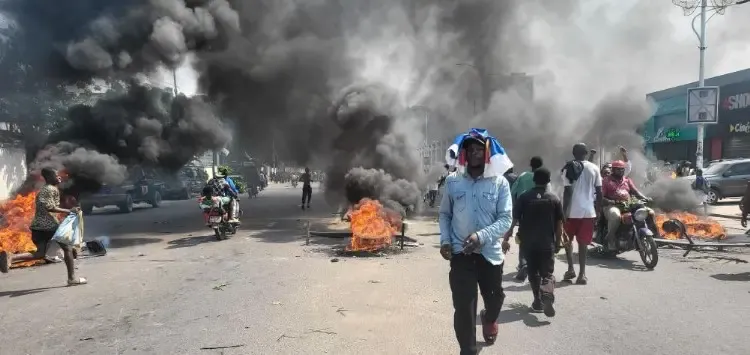M23 Armed Group Takes Control of Bukavu in DRC Amid AU Summit Concerns Over Regional Conflict

Synopsis
Key Takeaways
- M23 has entered Bukavu, escalating the conflict.
- AU summit aims to prevent regional war.
- M23 captured Kavumu Airport, a critical supply hub.
- Over 3,000 deaths reported since late January.
- UN stresses dialogue as the only solution.
Kinshasa, Feb 16 (NationPress) The March 23 Movement (M23) armed faction declared that its militants have entered Bukavu, the capital of South Kivu Province in the eastern Democratic Republic of the Congo (DRC).
With the conflict escalating, regional leaders gathered at the ongoing African Union (AU) summit, set to conclude on Sunday, aiming to avert a broader regional war, as reported by Xinhua news agency.
In a statement issued on Saturday, the M23 urged Bukavu residents to establish "vigilance committees" to maintain security and appoint trustworthy leaders. M23 spokesperson Laurence Kanyuka previously confirmed the group's entry into the city.
On Friday, the M23 reported its capture of Kavumu Airport, a crucial humanitarian and military supply center in South Kivu. This airport represents a key defensive position for Bukavu, located approximately 30 km away.
Local sources indicated to Xinhua that despite earlier assertions of no intent to seize the city, M23 fighters continued their advance towards Bukavu. Concurrently, some DRC soldiers and their allies were observed retreating towards Uvira, a significant commercial and transport hub near the Burundian border.
The latest offensive by the M23 follows their claim of capturing Goma, the capital of North Kivu Province, on January 26. Since early February, the rebels have taken several towns in South Kivu, causing panic among the residents of Bukavu.
Violence has surged in the eastern DRC as the M23 escalates its assaults. Since late 2021, the group has taken control of numerous strategic locations, including Goma, a regional urban center with over one million residents and 700,000 displaced individuals, the border trading town of Bunagana, and the mining center of Rubaya, globally recognized for its rich coltan deposits. The M23 has also established parallel administrations in occupied areas, appointing a "provincial governor" in North Kivu last week.
The fighting in South Kivu, driven by the M23's ongoing offensive, poses a threat to destabilize the entire region, according to United Nations (UN) Secretary-General Antonio Guterres, who expressed concerns during the AU summit in Addis Ababa, Ethiopia. The escalating crisis in the eastern DRC was prominently featured on the summit's agenda.
"Regional escalation must be avoided at all costs," stated the UN chief. "There is no military solution. The deadlock must end, and dialogue must commence."
Earlier in February, Burundian President Evariste Ndayishimiye warned that the conflict could evolve into a regional war if hostilities in eastern DRC persisted. "If it continues like this, war risks becoming widespread in the region," he cautioned.
Analysts attribute deep-rooted ethnic tensions and competition for the DRC's abundant mineral resources as significant factors driving the conflict. A report released in January by the International Crisis Group, a global conflict analysis organization, highlighted that the fall of Goma had displaced thousands and brought the Great Lakes region closer to widespread conflict.
The mineral-rich eastern DRC remains a crucial conflict zone, with militias and government forces contending for control over valuable resources such as coltan, tin, tantalum, and gold. Observers noted that the demand for these minerals significantly contributed to the outbreak of the Second Congo War in 1998.
On Friday, DRC government spokesperson Tina Salama confirmed that President Felix Tshisekedi would not attend this weekend's AU summit, opting instead to send Prime Minister Judith Suminwa Tuluka to Addis Ababa. Tshisekedi has also been absent from crucial regional meetings regarding the crisis, including a summit co-hosted last week by the East African Community and the Southern African Development Community in Dar es Salaam, Tanzania.
Efforts to negotiate peace have repeatedly faltered. In December, an AU-led peace summit under the Luanda Process, aimed at bringing Tshisekedi and Rwandan President Paul Kagame to the negotiating table, was suddenly canceled.
Angolan President Joao Lourenco, designated facilitator of the Luanda Process, assumed the AU presidency for a one-year term on Saturday. He expressed frustration over the stalled discussions but insisted that dialogue remains the only feasible path to peace.
"Our continent is going through a difficult period marked by conflicts, between the DRC and Rwanda, but also in Mozambique and Sudan, by terrorism and by unconstitutional regime changes. These are all issues to be managed within the framework of the AU presidency. Therefore, it is time for me to pass the baton to another head of state concerning the mediation between Kinshasa and Kigali," stated Lourenco.
The ongoing conflict between the M23 and the DRC government is deeply entrenched in the aftermath of the 1994 Rwandan genocide and long-standing ethnic tensions between the Tutsi and Hutu communities. The DRC accuses Rwanda of backing the M23, while Rwanda claims that the DRC army has allied with the Democratic Forces for the Liberation of Rwanda, a rebel group implicated in the genocide against the Tutsi.
The humanitarian situation in eastern DRC has drastically worsened in recent weeks. Since January 26, over 3,000 people have been killed, 2,880 injured, and more than 500,000 displaced, adding to the 6.4 million people already internally displaced in the region, according to the UN.










